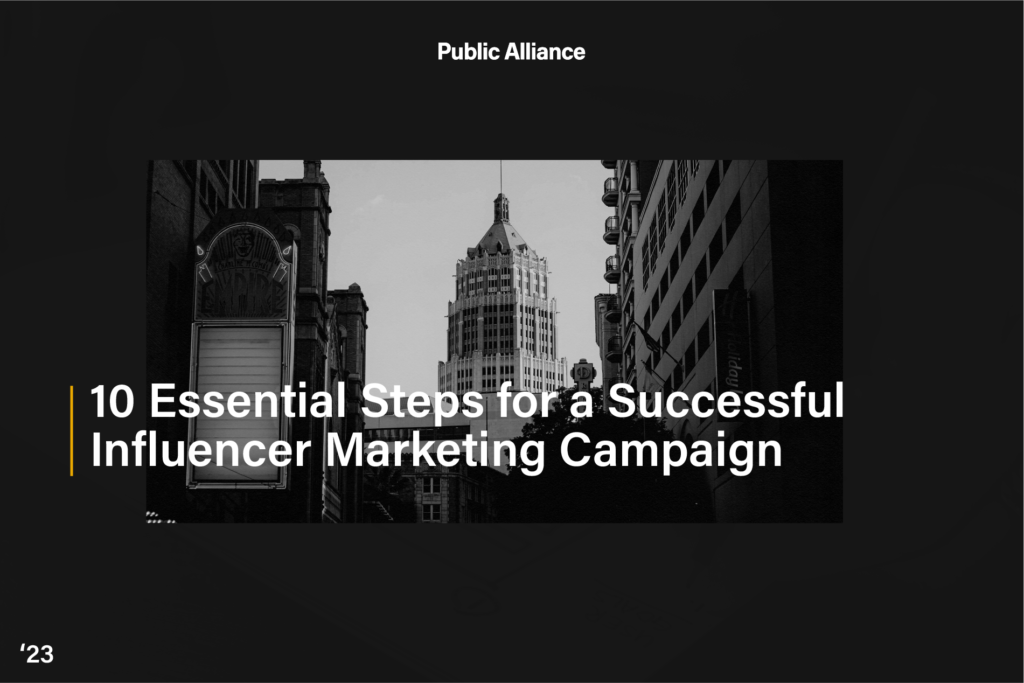Influencer marketing is a popular way for businesses to reach target audiences and increase brand awareness. However, with the rise of influencer marketing, many businesses make mistakes that can impact the success of their campaigns. Here are 10 essential steps for a successful influencer marketing campaign. Ignore them, and your whole campaign could fall apart.
- Research the influencer: Before partnering with an influencer, it’s crucial to research them thoroughly to ensure that they’re a good fit for your brand and target audience. One example of a brand that reaped the consequences of not verifying its influencers’ backgrounds is the now infamous Fyre Festival, which partnered with influencers to promote the festival, only to have it turn into a complete disaster.
- Choose the right type of influencer: Not all influencers are created equal, and choosing the wrong type of influencer can lead to poor results. For example, a beauty brand that partners with a gaming influencer may not see the desired results as their audiences may not overlap.
- Establish clear objectives: Without clear objectives, it’s difficult to measure the success of your influencer marketing campaign. For example, a clothing brand may want to increase sales through their influencer marketing campaign, but without clear goals and metrics in place, it will be difficult to determine if the campaign was successful.
- Plan clear guidelines: Providing clear guidelines for the influencer to follow is essential for maintaining the integrity of your brand. For instance, a food brand that fails to set clear guidelines for the influencer’s content may end up with a product review that’s not aligned with the brand’s values.
- Disclose sponsored content: Failing to properly disclose sponsored content can harm the trust between the influencer and their audience, as well as potentially violating advertising regulations. For example, a fitness influencer who does not clearly disclose their partnership with a supplement brand may harm their credibility with their audience.
- Be mindful of metrics: Metrics such as engagement rate, reach, and conversions are key indicators of the success of your influencer marketing campaign. Neglecting to track and analyze these metrics can make it difficult to optimize your campaign for future success.
- Production of quality content: High-quality content is essential for any influencer marketing campaign. Investing in professional photography, videography, and editing will help ensure your brand’s message is communicated effectively. For example, a tech brand that produces low-quality content with their influencer may not see the desired results.
- Don’t underestimate micro-influencers: Micro-influencers, those with smaller followings, can be just as effective as larger influencers. They often have a highly engaged audience and can deliver better results for your brand. For example, a local restaurant that partners with a micro-influencer in their area may see more direct results than partnering with a larger, national influencer.
- Build a relationship with the influencer: Building a relationship with the influencer is essential for the success of your campaign. This will ensure that the influencer is invested in the campaign and that they’re able to deliver their best work. For example, a clothing brand that fails to build a relationship with their influencer may not see the level of engagement they were hoping for.
Follow up with the influencer: This is essential to measure the success of the campaign and to ensure that both parties are satisfied with the experience. This will also lay the foundation for future collaborations. Following up with the influencer also helps assess the success of the collaboration and find areas for improvement. For example, if the influencer was able to drive a significant amount of traffic to the brand’s website and increase sales, it would be valuable to understand what specific tactics they used and replicate them in future campaigns. On the other hand, if the results were lackluster, the follow-up could shed light on what went wrong and help you make better decisions in future partnerships.








